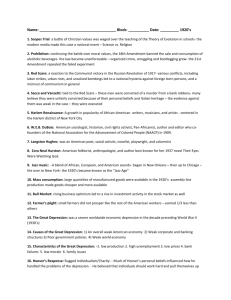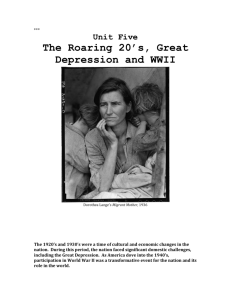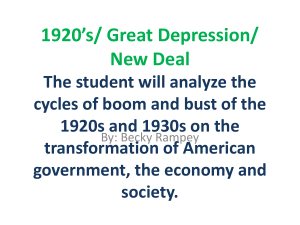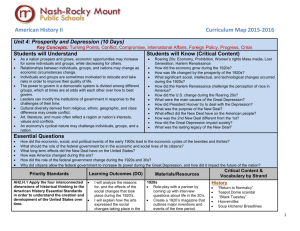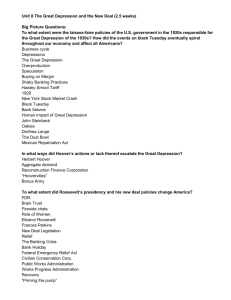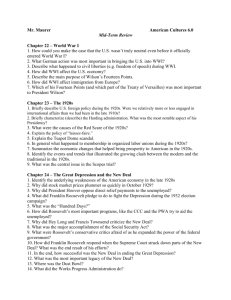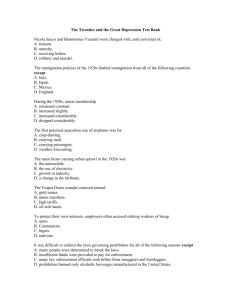Roaring Twenties & Depression US History Exam
advertisement
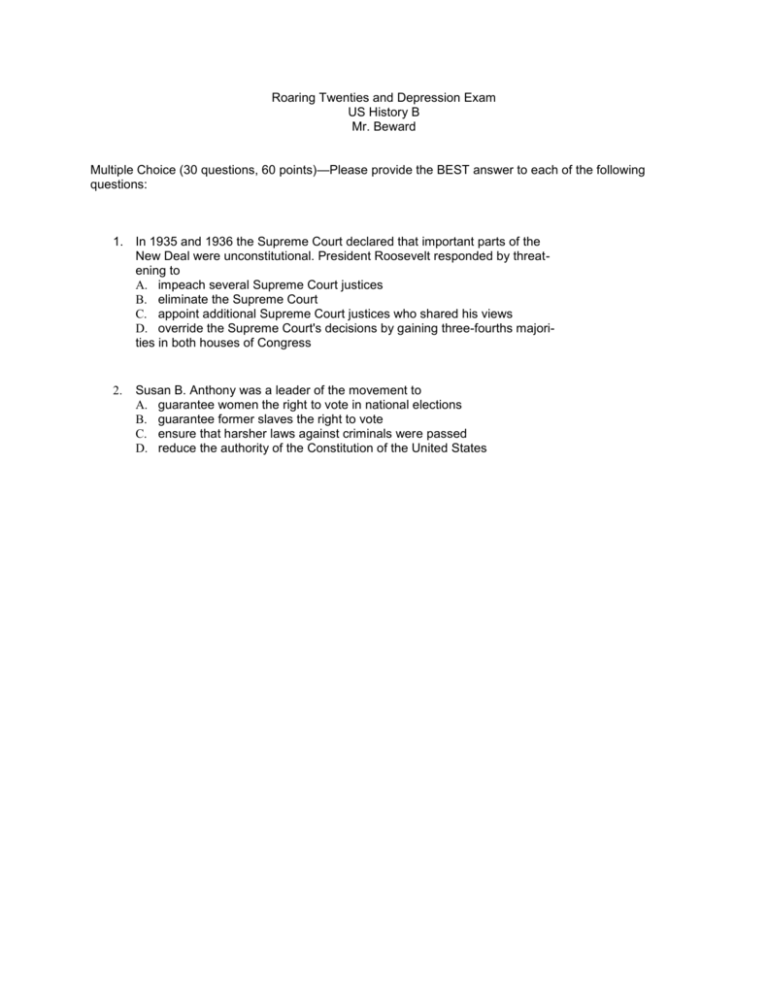
Roaring Twenties and Depression Exam US History B Mr. Beward Multiple Choice (30 questions, 60 points)—Please provide the BEST answer to each of the following questions: 1. In 1935 and 1936 the Supreme Court declared that important parts of the New Deal were unconstitutional. President Roosevelt responded by threatening to A. impeach several Supreme Court justices B. eliminate the Supreme Court C. appoint additional Supreme Court justices who shared his views D. override the Supreme Court's decisions by gaining three-fourths majorities in both houses of Congress 2. Susan B. Anthony was a leader of the movement to A. guarantee women the right to vote in national elections B. guarantee former slaves the right to vote C. ensure that harsher laws against criminals were passed D. reduce the authority of the Constitution of the United States 3. The poster above is from Warren G. Harding's 1920 presidential campaign. It was meant to appeal to A. poor people's mistrust of big business B. people's concerns about involvement in European conflicts C. union members' fears of communist domination of unions D. recent immigrants' fears of prejudice in the United States 4. The phrase "Harlem Renaissance" refers to A. African American political gains during the Reconstruction period B. African American achievements in art, literature, and music in the 1920's C. religious revival in the African American community that swept the nation in the 1950's D. a series of urban renewal projects that were part of the Great Society program of the 1960's 5. Many writers of the "lost generation," such as F. Scott Fitzgerald, wrote books in which they A. criticized what they regarded as the shallow materialism of the United States during the 1920's B. sought to capture the freedom experienced by people living on the western frontier C. praised the quick pace and unique opportunities found in large cities in the United States D. expressed deep yearning for what they regarded as the simple lives led by rural Americans 6. A consequence of Prohibition was A. the failure of the Republicans in the 1928 presidential election B. the growth of organized crime C. the turning of public attention to pressing international issues D. widespread popular support for further moral reform 7. The prosperity of the 1920's was largely based on A. a strong banking sector B. increased agricultural profits C. an expanded volume of exports D. the automobile and housing industries 8. Which groups were largely excluded from the prosperity of the 1920's? A. The middle class B. Farmers and workers C. Stockbrokers and bankers D. Industrialists 9. Which sentence states what most New Deal supporters thought the federal government should do? A. The federal government should protect business in order to increase productivity. B. The federal government should protect the rights and interests of minority groups. C. The federal government should regulate and directly stimulate the economy by spending and hiring. D. The federal government should play as small a role as possible in the economy. 10. How do you think Huey Long would have tried to solve the problems of the country? A. By dividing wealth more evenly B. By giving federal aid to industry C. By establishing farm price supports D. By working closely with business leaders 11. An advocate of President Franklin D. Roosevelt's farm policy would have likely supported which economic strategy? A. Reducing agricultural output to increase product values B. Utilizing minimum wage laws to stimulate farm productivity C. Allowing market forces to operate freely to achieve stabilization D. lncreasing agricultural production to ensure an affordable food supply 12. What notable legal contest exposed the widening cultural rift between religion and modern science during the twentieth century? A. Plessy v. Ferguson B. The Sacco and Vanzetti trial C. The Scopes trial D. Korematsu v. United Sfafes 13. The Wagner Labor Relations Act of 1935 addressed what labor issue? A. Workplace safety B. Health insurance C. Collective bargaining D. Minimum wage 14. Which of the following factors was most significant in contributing to the onset of the Great Depression in the United States? A. Declining agricultural prosperity B. lncreasing reliance on foreign imports C. An inadequately skilled workforce D. Vast military expenditure during World War I 15. ln 1927, people around the world were thrilled by radio reports of Charles Lindbergh's successful solo flioht across the Atlantic Ocean. Movie newsreels featuring the young, handsome pilot helped make him an international hero. What was a larger impact of Lindbergh's accomplishment? A. lt improved relations between the United States and France. B. lt demonstrated the airplane's ability to be used as a long-range bomber. C. lt made people realize the United States could not isolate itself from world events. D. lt helped launch the age of commercial passenger aviation. 16. How would an active supporter of the Socialist' Party during the Great Depression most likely have felt about the Tennessee Valley Authority? A. Alarmed, because it was an unprecedented and dangerous step toward collectivization. B. Angry, because it represented a threat to the spirit of free enterprise and entrepreneurial capitalism. C. Enthusiastic, because government was asserting itself in the private sector to benefit many people. D. Discouraged, because government was undermining small family farmers and subsidizing agribusiness. 17. This photo depicts an early automobile assembly line. Which developments are directly associated with the mass production method shown? A. Consumerism, advertising, and the installment plan B. The Nineteenth Amendment and child labor laws C. Trust-busting, muckraking, and the Square Deal D. The Red Scare and the Great Depression 18. Famous as one of the few places in the 1920s that permitted interracial dancing, the Savoy Ballroom is most closely associated with which movement? A. Abolitionism B. Feminism C. Harlem Renaissance D. Women's suffrage 19. Who likely made this statement? I wear bobbed hair and powder my nose. I wear fringed skirts and bright-colored sweaters, scarves, waists with Peter Pan collars, and low-heeled shoes. I adore danclng! I spend much time in automobiles. lattend hops, proms, ballgames, crew races, and other affairs at men's colleges. A. A post-World War ll suburbanite B. A Roaring Twenties flapper C. A Depression-era homemaker D. A Gilded Age feminist 20. This 1926 magazine cover depicts two figures dancing the Charleston: ln what novel does the female social type depicted in this image make a prominent appearance? A. Lolita B. The French Lieutenant's Woman C, Revolutionary Road D. The Great Gatsby 21. The first commercial radio broadcasts, a predominantly bull stock market, and the emergence of surrealism and art deco were features of which decade? A. 1890s B. 1910s C. 1920s D. 1930s 22. Consider this conversation from the 1920s: "Have you bought an automobile yet?" "No, we felt we couldn't afford one.' "Mr. Budge has one and he is not as well off as you are.” "Yes, I know. But their second installment came due, and they had no money to pay for it." "Did they lose the car?" "No, they got the money and paid the installment." "How did they get the money?" "They sold the cook-stove." "How could they get along without a cook-stove?" "They didn't. They bought another one on the installment plan." This conversation illustrates the influence of which factor associated with the 1929 stock market crash? A. lncreasing consumer reliance on credit B. Federal deregulation of the banking industry C. Reduced wages and rising unemployment D. Growing postwar profits in the industrial sector 23. This 1930s cartoon depicting President Franklin D. Roosevelt holding an electric wire and light bulb relates to what New Deal program? A. The AAA B. The CCC C. The REA D. The SEC 24. Depression-era artists received important sponsorship from what New Deal agency? A. The Civil Works Administration B. The National Recovery Administration C. The Public Works Administration D. The Works Progress Administration 25. What was the main consequence of the Senate's refusal to ratify the Treaty of Versailles? A. Civil liberties were curtailed during the Red Scare. B. The League of Nations was greatly weakened. C. American troops in France and Germany were demoralized. D. Congress passed the Sedition Act to silence public dissent. 26. The radio had which significant impact on US society? A. lt transformed attitudes toward gender roles. B. lt increased access to news and entertainment. C. lt stimulated greater readership of newspapers. D. lt heightened consumer interest in television. 27. With which of the following are Zora Neale Hurston and Langston Hughes most closely associated? A. Great Depression B. Harlem Renaissance C. Women's suffrage D. World War ll 28. Which achievement made Charles Lindbergh an instant celebrity? A. Development of the first polio vaccine B. Release of the first motion picture with sound C. Completion of the first solo flight across the Atlantic Ocean D. Receipt of the first Nobel Peace Prize awarded to an American 29. Which of the following sports stars was known for his long home runs and helped to usher in the Golden Era of Sports? A. Babe Ruth B. Red Grange C. Gertrude Ederle D. Jack Dempsey 30. What was Herbert Hoover’s main attempt to stop the foreclosures created by the Great Depression? A. Creation of the Hoover Dam B. Emphasis on the associative state C. Formation of the Reconstruction Finance Corporation D. Building of voluntary partnerships Constructed Responses (write both, 20 points each, 40 points total)—Please write well-considered responses that take a position on each question and then defend that position with evidence from the unit 1. Many historians of the 1920s blame the lack of government regulation of business as the primary reason for the Great Depression. Assess the validity of this statement. Are there other realistic explanations for the Depression? 2. Some historians argue that Franklin Roosevelt’s New Deal did not get us out of the Great Depression, rather asserting that World War II intervened to end the financial disaster. Assess the validity of this statement
